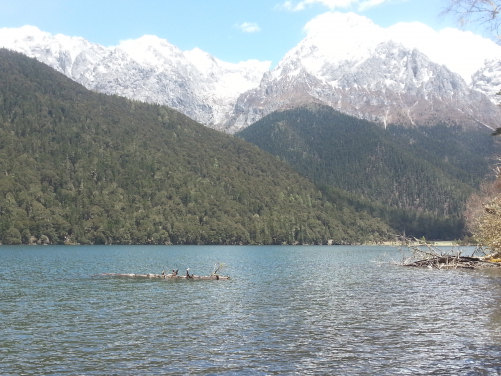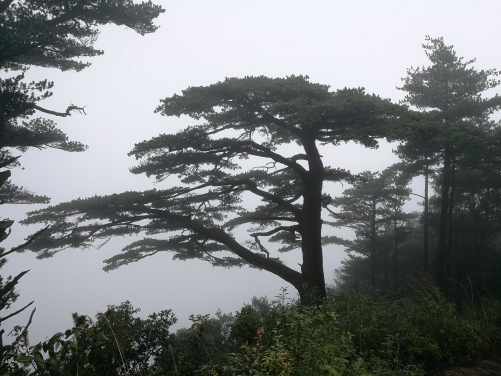Media
Old-growth trees show higher drought resistance than younger trees
Study highlights importance of conserving old-growth forests as major carbon sinks
05 Dec 2022

Gongga Mountains, Kangding, Sichuan. Dominant tree species in the forest is Abies georgei Orr. (Photo credit: Dr Jinbao Li)

Old-growth trees, such as the one pictured in the center, are more drought resistant than surrounding young trees of the same species (Pinus kwangtungensis). Photo credit: Dr Jinbao Li.

Old-growth trees, such as redwoods (Sequoia sempervirens) in California, play a major role in global carbon sequestration. (Photo credit: Dr Jinbao Li)

Luoji Mountains, Xichang, Sichuan. Dominant tree species in the forest is Abies georgei Orr. (Photo credit: Dr Jinbao Li)
- 1 / 4
- 2 / 4
- 3 / 4
- 4 / 4
Reforestation has been identified as a potential nature-based solution to mitigate climate change in the latest Intergovernmental Panel on Climate Change (IPCC) assessment report. In the 2022 United Nations Climate Change Conference (COP27), the Sharm el-Sheikh Implementation Plan re-emphasises the importance of protecting and conserving forests as sinks of greenhouse gases.
A recent study suggests that top conservation priority should be given to the older trees in the upper canopy owing to their exceptional drought tolerance and carbon storage capacity. Furthermore, a diverse forest structure and composition could boost their ability to withstand future droughts under climate change.
Led by geographers from the University of Hong Kong and Indiana University, the study analysed nearly 22,000 trees across five continents and reveals that old-growth trees are more tolerant to drought stress than younger canopy trees and could better buffer extreme climate.
The results highlight the importance of conserving the existing old-growth forests, not only for harboring exceptional biodiversity in the forests, but also for carbon sequestration and mitigation of climate change. The study is published online in Nature Climate Change.
“Past deforestation and selective logging on old-growth forests plus recent reforestation endeavors have made the world’s forests more dominated by younger trees. However, extreme climate events such as drought occurring more frequently in many regions of the world due to global warming, raise concern for these less mature forests,” said Dr Jinbao Li, a senior author of the study and an Associate Professor of Geography at the University of Hong Kong (HKU).
“It becomes imperative to understand how the younger trees are resilient to severe droughts in comparison with old-growth trees of the same species,” remarked Dr Tsun Fung Au, a former PhD student at Indiana University and now a postdoctoral fellow at the Institute for Global Change Biology, University of Michigan and the lead author of the study.
Using long-term tree-ring data of 21,964 trees from 119 drought-sensitive species in five continents, Au and Li with an international team of climate scientists and ecologists found that younger hardwood trees in the upper canopy reduce growth by 28% during drought, compared to a 21% growth reduction experienced by older hardwood trees. Such a seven percentage points’ disparity in drought response could magnify to 17 percentage points during extreme drought.
The authors also found age-dependent drought response differences in conifers are smaller than in hardwoods, probably because conifers tend to live in more arid environments and have evolutionarily adapted to dry climate.
The age differences in growth reduction may seem trivial, but they could have a substantial consequence on the carbon budget when applied on a global scale. In the short term, the impacts of drought on forests and carbon sequestration could be severe because of the dominance of younger trees and their greater drought sensitivity. However, better recovery ability of these younger trees could be conducive to carbon stock in the long run.
A unique aspect of this study is its focus on trees in the upper forest canopy, which reduces confounding effects of tree height and size. Additionally, trees in the upper canopy layer play a more critical role in providing ecosystem functions such as carbon uptake and microclimate buffering than the understory trees.
In addition to Au and Li, the study authors are Justin T. Maxwell, Scott M. Robeson, Sacha M. O. Siani, Kimberly A. Novick and Richard P. Phillips of Indiana University, USA; Matthew P. Dannenberg of the University of Iowa, USA; Teng Li of Guangzhou University, China; Zhenju Chen of Shenyang Agricultural University, China; and Jonathan Lenoir of the CNRS at Université de Picardie Jules Verne, France.
The study received funding from Indiana University, the Hong Kong Research Grants Council, the National Natural Science Foundation of China, and in part from Lilly Endowment Inc., through its support for the Indiana University Pervasive Technology Institute.
Link of article at Nature Climate Change
https://doi.org/10.1038/s41558-022-01528-w
For Media enquiries, please contact:
Communications and Public Affairs Office
Ms Melanie Wan (Tel: 2859 2600 / Email: melwkwan@hku.hk)
Ms Jaymee Ng (Tel: 3910 3612 / Email: ngjaymee@hku.hk)
Mr Kenneth Choi (Tel: 2859 2607 / Email: khkchoi@hku.hk)
